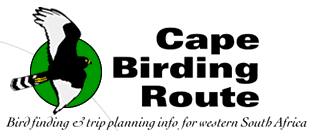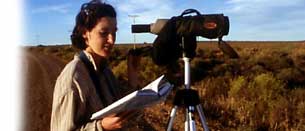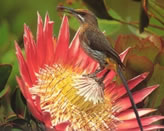Select
Specials: West Coast
Black Harrier
This
striking harrier is one of four raptor species endemic to
southern Africa. It ranges widely over scrub and grassland
in western South Africa, and is most regularly encountered
in the West Coast National Park. While the pied adults are
very distinctive, immature birds regularly pose identification
challenges. They are best recognized by their combination
of a white rump, white undersides to the inner flight feathers
(which result in a pale patch on the underwing), dark upperparts
and brown, streaked underparts. The Black Harrier is the emblem
of the Percy FitzPatrick Institute of African Ornithology,
an organization of international repute based at the University
of Cape Town and involved in research on the ecology, evolution
and conservation of the continent’s birds.
Southern Black Korhaan
This
small bustard, endemic to the winter-rainfall areas of South
Africa, is one of the most characteristic species of the West
Coast and is held in fond regard by the locals. It is sexually
dimorphic, and the strikingly plumaged males produce a raucous,
grating call in spring. It has been split from the Northern
Black Korhaan of the interior grasslands on the basis of differences
in call, display, size, plumage and examination of genetic
material (see p.12). Although it is widespread throughout
the region and may be seen anywhere, it is best found by searching
the road edges in the West Coast National Park (p.49). Korhaan
is an Afrikaans word that refers to small bustard species,
and is derived from the Dutch word for the Palaearctic Black
Grouse (Tetrao tetrix).
Protea Canary
Protea
Canary is regarded as one of the most elusive of the fynbos
endemics, largely because it is uncommon close to Cape Town.
It can, however, be quite common in many of the less accessible
mountainous areas of the region, such as the Cederberg Wilderness
Area. For visitors without the time to venture so far off
the beaten track, the best areas to search for it are Kransvlei
Poort (p.56), Paarl Mountain (p.82), Mitchell’s Pass
(p.81), and, further afield, Swartberg Pass (p.123). Although
inconspicuous, it draws attention to itself by its distinctive
song. It is by no means restricted to protea stands; in fact
in many areas it appears more common in tall, non-protea vegetation.
Cloud Cisticola
The
Cloud Cisticola is best detected in spring when the calling
males are visible as distant, almost imperceptible specks
fluttering high in the air during their undulating display
flight. Good views can often be obtained by waiting patiently
until they eventually drop sharply to land in the grass. The
southern Cape subspecies is distinct from others further north,
in South Africa and Zambia, both vocally and by its conspicuously
streaked breast, which is an excellent field character to
separate it from the otherwise dauntingly similar Fan-tailed
Cisticola. There are several indications that this distinctive
subspecies may be a full species (see p.13). It is best found
in grassy and agricultural lands, especially the Tienie Versveld
and Oudepos Wildflower Reserves (pp.46 and 45) and the Overberg
wheatlands of the south coast (p.64).
|


